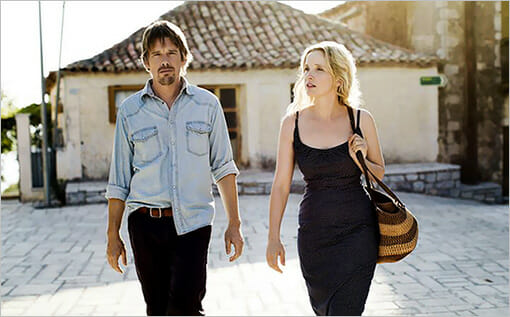Before Midnight

One of cinema’s great love stories is now even richer—full of the complexity that comes with longevity. Before Midnight caps off one of the most compelling, emotionally satisfying trilogies ever filmed. (Whether or not it stays a trilogy nine years from now is anyone’s guess.) Director Richard Linklater and actors Ethan Hawke and Julie Delpy understand the joys and struggles of aging with someone you love, and have packed several years worth of feelings into 105 minutes. The movie contains more pain than its predecessors, Before Sunrise and Before Sunset, but that’s because it’s a wiser, more mature work.
(NOTE: Some fans don’t want to know a thing about what’s happened to Jesse and Celine since Before Sunset. While this review avoids any major plot spoilers, it does discuss the film’s premise.)
Until Before Sunset came out in 2004, no one was expecting a sequel to 1995’s Before Sunrise, an enchanting romance about two people spending what they presumed would be their only night together. The first film was ballsy and rule-breaking in its simplicity: It was about two people, walking around Vienna and talking until a train connection sent them on their separate ways. Its appeal lay in the immediacy and urgency it gave to the human connection between the thoughtful French woman, Celine, and the eager American man, Jesse. Its two young heroes were full of ideas that they wanted to share with one another. Before Sunset revisited the pair for another walk, this time through Paris, as they meet for the first time since that night in Vienna, now wiser and more aware of just how special what they had was.
The first two films succeeded on the quality of their dialogue, both in performance and writing. Setting up long stretches of spoken word with no action is considered a sure-fire path to failure for good reason—if it doesn’t work, it puts the audience to sleep. Like its predecessors, Before Midnight has no such problem. It’s constantly compelling. It leaves you waiting eagerly to hear what the characters say next.
Hawke and Delpy are utterly comfortable in their roles, able to play off one another in Linklater’s long, unbroken takes. The first scene between them, talking in a car while their daughters sleep in the back seat, is shot in a single 13-minute two-shot. It is full of warmth and humor, and quickly catches the viewer up to speed on the characters’ lives.
The biggest change between Before Midnight and the previous two movies is that the characters well and truly know one another now. They’ve spent the last nine years together, raising two daughters, and know all about each other’s life and work. They are now at the stage in life when responsibilities and duties have piled up, things are overwhelming, and they aren’t sure if they’ve made the right life choices.
-

-

-

-

-

-

-

-

-

-

-

-

-

-

-

-

-

-

-

-

-

-

-

-

-

-

-

-

-

-

-

-

-

-

-

-

-

-

-

-








































